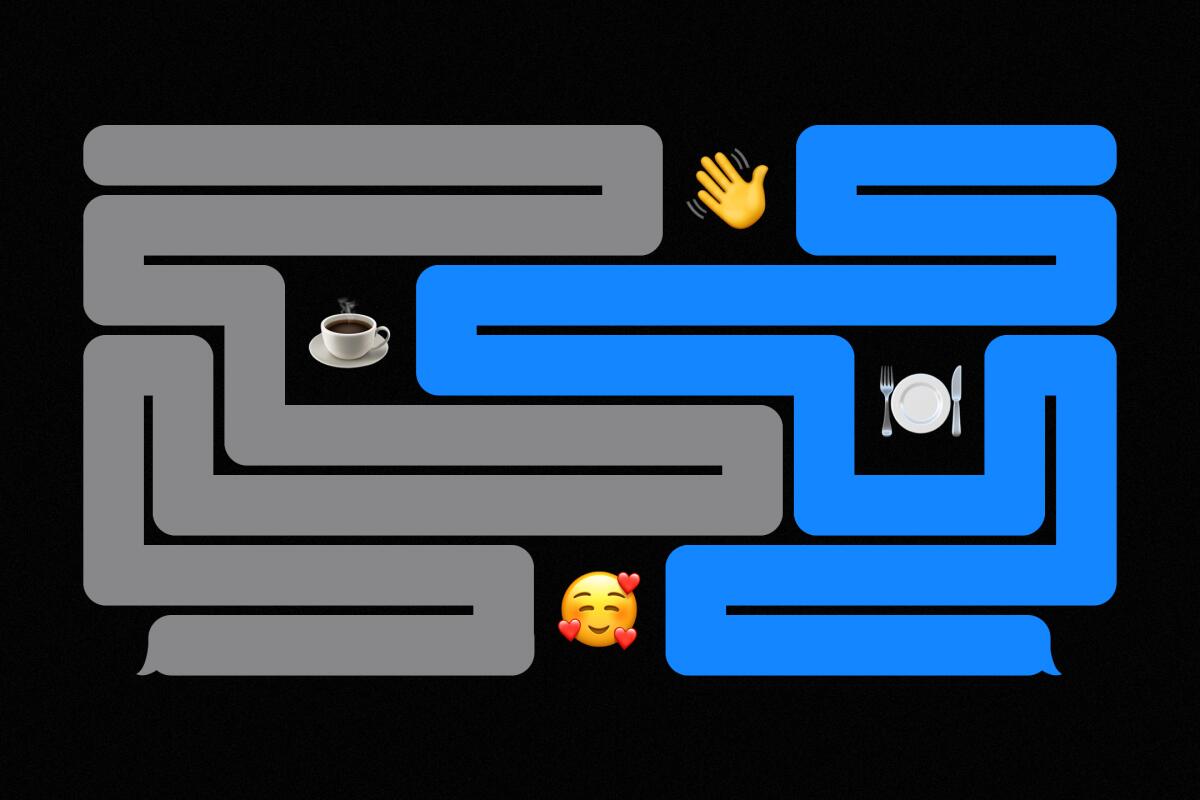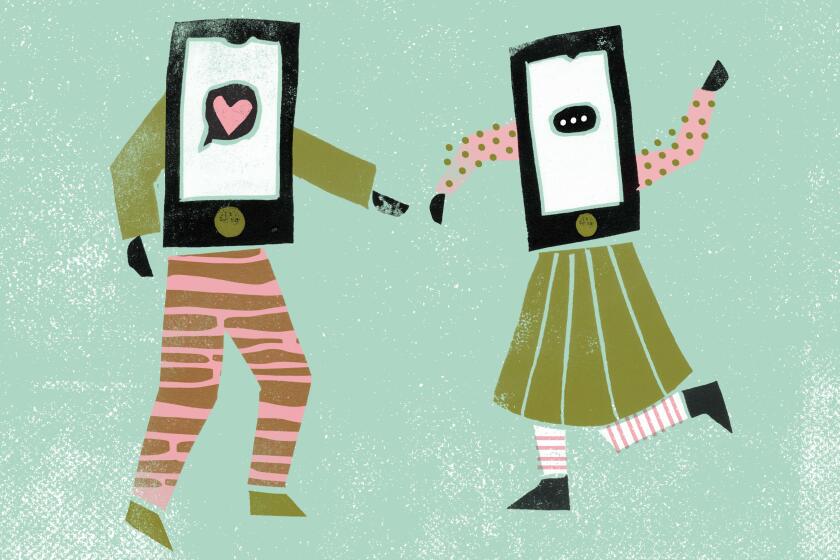Don’t let the texting traps come for you during cuffing season

- Share via
For weeks you’ve been exchanging paragraph-long text messages with your crush, but they’ve yet to ask you out on an official date — and now you’re starting to feel antsy.
Perhaps you’ve dropped subtle hints that you’d like to meet them IRL — like mentioning the upcoming release of a movie that you’ve both shown interest in seeing — but they haven’t picked up on it. Or maybe you’ve already gotten into the habit of sending “good morning” and “good night” texts to each other on a daily basis, even though you haven’t had any face-to-face interactions yet.
You might have unwittingly fallen into what some relationship experts call a “texting trap” or a “textuationship,” which is a relationship that exists solely on your phone.
As you’re more likely to meet a romantic partner via a dating app than in person or through personal connections, texting, or messaging within the app, has become an integral part of the courtship process.
There are benefits to texting your crush before meeting them in person: It can help you learn about their interests, establish a general rapport, check for red flags and determine whether or not you’d feel safe in their company. But when does texting move from being helpful to being a trap? And how do you escape it?
There’s no one-size-fits-all answer for how long you should text someone before going on a first date, but Damona Hoffman, an L.A.-based certified dating coach, urges her clients to get out of this phase ASAP.
“When you are stuck in that phase, you’re trying to screen and determine if somebody is a good match for you, but you can’t really do it through text alone,” says Hoffman, who is also the love expert on “The Drew Barrymore Show” and host of the podcast “Dates & Mates,” where she has been talking about this very topic for nearly a decade, including in this recent episode. (She’s also held workshops on texting traps.)
When talking to someone face to face, you have verbal cues to lead you on. With texting, you question everything.
The texting trap could be avoided if people were more straightforward with one another, relationship experts say. Easier said than done, right?
“Part of becoming empowered in our lives and in dating is just speaking our needs directly and plainly, but it does require courage,” says Brooke Sprowl, founder of My LA Therapy and host of the podcast “On Living.”
“It’s hilarious how hard it is to ask someone, ‘Want to go have tea?’”
“It’s hilarious how hard it is to ask someone, ‘Want to go have tea?’ because when we haven’t done our inner healing work and we’re looking for validation from the outside world … Then all of a sudden, it’s not I’m asking you out for tea, it’s I’m asking you if I’m a worthwhile human being. It’s so much deeper.”
Hoffman, Sprowl and L.A.-based marriage and family therapist Steven Reigns say that to break free of the text chains, you must make a move. Here’s how.
Why time is of the essence
While there’s no universal time frame for how long you should text someone before scheduling a first date, Hoffman suggests one week.
Why the urgency? When you text a prospective partner for too long, you run the risk of oversharing details of your life that you’d typically never tell a stranger or new acquaintance, she says. You’re also more likely to create an idealized version of that person that may or may not exist.
Texting can feel like a choreographed dance, as people are often calculating their responses. By texting instead of meeting face-to-face, you’re also missing out on the elements that make a conversation more engaging, including verbal cues, body language and voice inflections.
I waited for a wonderful man to show up at my door. Then one literally did.
Another unintended consequence of this cycle is that you can cause the other person to lose interest in you. Hoffman relates it to this simple analogy: “It’s like they’re hungry and you’re giving them snacks. Then you’re like, ‘Here’s the meal’ and they’re like, ‘Oh, I’m already full,’” so there’s no point in meeting IRL.
According to Hoffman, texting should be reserved for casual chatting, but not the deep, thought-provoking conversations that help you really get to know someone. If your crush continues to ask you these types of questions — like where do you see yourself in 10 years? — via text, it’s your chance to say something like, “I would love to tell you more about that when we meet in person,” or you can just ask them out, Hoffman suggests.
For Reigns, it’s alarming when people have already gotten into a rhythm of sending and/or receiving “good morning” and “good night” texts from someone they’ve never spent time with.
“I feel like that should be an earned position,” says Reigns, who is the founder of Therapy for Adults. “Look how much they’re in your life already, and you haven’t even had an [in-person] interaction. And the reason that’s concerning is because there’s familiarity and there’s the building [of] an emotional bond with someone that’s not necessarily rooted in real-life interactions.”
What causes texting traps
Frankly, there are some people you’ll encounter who will have zero interest in meeting you IRL, and there could be a host of reasons why. They could be a catfish (someone who pretends to be someone else online), have low self-esteem, be married or be just plain bored and looking for entertainment, Hoffman says. Whatever the reason is, it’s up to you to be upfront about your intentions.
“This is why bringing it to a head and just asking for what you want is the best way to clarify where that person is,” Hoffman says. “Because if they’re really interested in a relationship and they’re not hiding things and they’re not just there for entertainment sake, they’ll pick up the reins and run with it if they actually want to meet.”
Dating in small-town Colorado didn’t prepare me to look for love in L.A.
You may think that you’re being too direct with your crush, but it’s better than expecting them to read your mind or your coded messages.
“So much of the miscommunication is because we’re hinting,” says Sprowl. “We project that the other person is understanding our hints and deliberately not responding to them, when actually they may completely be missing the hints because they don’t know you.” They also have their own “set of assumptions [that] they bring into relationships,” she adds.
And some people opt for texting relationships because they provide a false sense of safety in dating.
“What’s funny is that most of the time, both people want to meet up and neither of them are saying it because they’re too afraid of being rejected or coming on too strong,” Sprowl says. “[But] actually, both people would be relieved if the other person would just make the suggestion, and both are too scared to be the one to have the courage.”
How to escape texting purgatory
Once you’ve decided that you’re ready to meet your crush in person, it’s crucial to not only be direct, but also hyperspecific. It’s a running joke among Angelenos that “let’s hang out sometime” means you’ll never hang out.
“It’s Los Angeles, we’re all busy, so it’s like, ‘Now I need to look at my calendar?’” Reigns says. “I think if you’re interested in meeting up with someone, do the labor of coming up with an idea of a date, a time and a location, and present that to the person.”
Instead of saying, “We should get drinks sometime,” say, “Are you free Thursday night for drinks at [location] at [time]?” That way you can schedule a date in one inquiry instead of having several back-and-forth exchanges about your availability.
But if the thought of asking your crush out still makes you sweat, Sprowl reminds us that it’s a win-win situation. Once you invite them out, you’ll secure a date or get a signal to move on to the next one.
“I think it’s just so important to remind ourselves that we can’t mess it up with the right person,” she says. “The right person is not going to be scared away from you asking them to coffee,” she says. “If somebody is scared away by that, and that’s what you want, you want to eliminate them.”
More to Read
Sign up for The Wild
We’ll help you find the best places to hike, bike and run, as well as the perfect silent spots for meditation and yoga.
You may occasionally receive promotional content from the Los Angeles Times.














